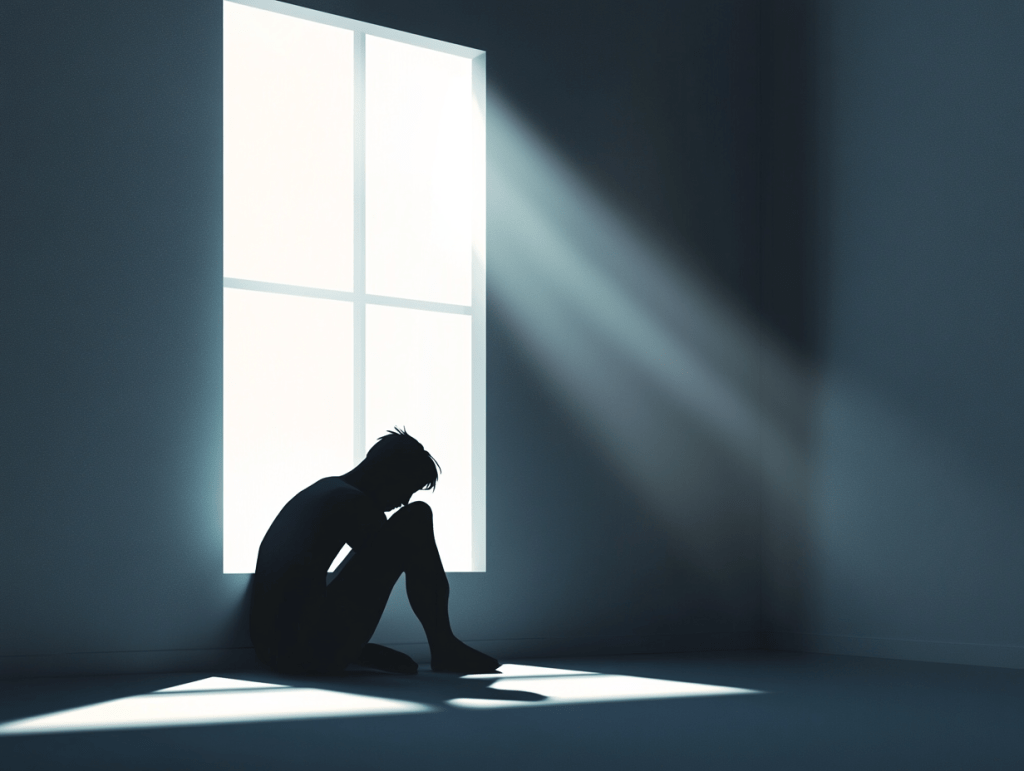Cannabis bei Depressionen: Symptome, Therapie & Studienlage
Depressionen zählen zu den häufigsten psychischen Erkrankungen weltweit. In Deutschland erlebt etwa jeder fünfte Mensch im Laufe seines Lebens eine depressive Episode. Die Symptome reichen von Antriebslosigkeit über Schlafstörungen bis hin zu tiefer Traurigkeit. Wenn herkömmliche Therapien nicht den gewünschten Erfolg bringen oder mit starken Nebenwirkungen einhergehen, kann Cannabis bei Depressionen eine alternative Behandlungsoption darstellen. Studien zeigen, dass medizinisches Cannabis helfen kann, depressive Symptome zu lindern und die Lebensqualität zu verbessern¹.Häufige Formen und Symptome einer Depression
Typische Symptome einer Depression sind anhaltende Niedergeschlagenheit, Interessenverlust, Schlafstörungen und Konzentrationsprobleme. Es gibt verschiedene Formen der Depression, darunter die unipolare Depression, die bipolare Störung und die chronische Depression. Cannabis bei Depressionen kann insbesondere bei chronischen und therapieresistenten Formen eine Option sein⁵.
Ursachen und Schweregrade
Die Ursachen von Depressionen sind vielfältig. Neben genetischen Faktoren spielen auch neurobiologische Prozesse, hormonelle Veränderungen und psychosoziale Belastungen eine Rolle. Eine Dysregulation des Endocannabinoid-Systems wird ebenfalls mit Depressionen in Verbindung gebracht, was den Einsatz von Cannabis bei Depressionen als therapeutische Maßnahme unterstützt5.
Die Schweregrade reichen von leicht bis schwer. Bei schweren Fällen ist oft eine Kombination aus Psychotherapie und medikamentöser Behandlung notwendig. Cannabis bei Depressionen kann hierbei eine ergänzende Rolle spielen2.

Behandlungsmöglichkeiten: Von Klassisch bis Cannabis
Neben Psychotherapie und medikamentöser Behandlung wird Cannabis bei Depressionen als ergänzende Therapieform diskutiert. Besonders bei Patienten, die auf herkömmliche Antidepressiva nicht ansprechen oder diese nicht vertragen, kann medizinisches Cannabis eine Alternative darstellen. Es ist jedoch wichtig, die Therapie unter ärztlicher Aufsicht durchzuführen5.
Natürliche Alternativen: Pflanzliche Ansätze gegen Depressionen
Viele Betroffene suchen nach natürlichen Wegen, ihre Depression zu behandeln. Cannabis bei Depressionen bietet eine pflanzliche Alternative zu synthetischen Antidepressiva. Die Wirkstoffe THC und CBD interagieren mit dem Endocannabinoid-System des Körpers, das eine Rolle bei der Regulierung von Stimmung und Emotionen spielt. Untersuchungen deuten darauf hin, dass insbesondere CBD antidepressive Effekte haben kann².
Depressionen können durch eine Vielzahl von Faktoren ausgelöst werden, darunter genetische Veranlagung, biochemische Ungleichgewichte und belastende Lebensereignisse. Die Behandlung erfordert oft einen individuellen Ansatz. Cannabis bei Depressionen kann hierbei eine unterstützende Rolle spielen, insbesondere wenn andere Therapien nicht ausreichend wirken oder nicht vertragen werden⁴.
Cannabis als Therapieoption: Wirkung, Vorteile und Studienlage
Cannabis wird zunehmend als ergänzende oder alternative Therapieform bei Depressionen anerkannt. Studien deuten darauf hin, dass der mittlere Schweregrad der Depression unter der Behandlung mit Cannabisblüten signifikant abnimmt³. Viele Patienten berichten im Vergleich zu klassischen Antidepressiva von einer besseren Verträglichkeit und einer schnelleren Linderung der Symptome5.
Die enthaltenen Cannabinoide, insbesondere THC und CBD, können stimmungsaufhellende und beruhigende Effekte haben. Sie beeinflussen stimmungsrelevante Neurotransmitter wie Serotonin, das eine Schlüsselrolle bei der Regulierung von Stimmung und Emotionen spielt. Die Wahl der Cannabissorte erfolgt dabei individuell durch den behandelnden Arzt, abgestimmt auf die spezifischen Symptome des Patienten – wobei es etwas Zeit benötigen kann, bis die passende Sorte gefunden ist4.
Cannabis kann in manchen Fällen die Wirkung klassischer Antidepressiva ergänzen oder diese bei unzureichendem Ansprechen sogar ersetzen. Viele Betroffene berichten von Verbesserungen in Bereichen wie Stimmung, Schlaf und Antrieb – oft bei gleichzeitig besserer Verträglichkeit1.
Studienlage zu Cannabis bei Depressionen: Was sagt die Forschung?
Trotz dieser positiven Erfahrungen ist die Studienlage zu Cannabis bei Depressionen bislang noch begrenzt. Erste Erhebungen und zahlreiche Erfahrungsberichte zeigen zwar vielversprechende Effekte, doch die genaue Wirksamkeit wird weiterhin intensiv erforscht. Eine enge ärztliche Begleitung ist in jedem Fall essenziell2.
Medizinal-Cannabisgesetz 2024: Was Patienten in Deutschland wissen müssen
Seit dem 1. April 2024 gilt in Deutschland das Medizinal-Cannabisgesetz (MedCanG), das die Verschreibung von medizinischem Cannabis neu regelt. Demnach dürfen alle approbierten Ärztinnen und Ärzte – mit Ausnahme von Zahn- und Tierärztinnen bzw. -ärzten – Cannabisarzneimittel verschreiben, sofern eine anerkannte medizinische Indikation vorliegt und keine andere Therapie ausreichend wirksam oder verträglich ist. Die Verordnung erfolgt auf einem normalen Rezept und nicht mehr auf einem Betäubungsmittelrezept. Die Kostenübernahme durch die gesetzliche Krankenversicherung ist möglich, wenn die Voraussetzungen gemäß § 31 Absatz 6 SGB V erfüllt sind.5
Nebenwirkungen und ärztliche Begleitung
Mögliche Nebenwirkungen können sein:
- Mundtrockenheit
- Schwindel
- Müdigkeit
- Konzentrationsprobleme
Es ist wichtig, die Therapie unter ärztlicher Aufsicht zu beginnen und regelmäßig zu kontrollieren, um Nebenwirkungen zu minimieren3.
Häufig gestellte Fragen
Was versteht man unter medizinischem Cannabis bei Depressionen?
Medizinisches Cannabis wird gezielt zur Behandlung von Erkrankungen wie Depressionen eingesetzt. Die in der Pflanze enthaltenen Wirkstoffe, insbesondere THC und CBD, können stimmungsaufhellend und entspannend wirken. Die Behandlung erfolgt stets unter ärztlicher Kontrolle und nach individueller Indikationsstellung. Mehr erfahren
Wie kann Cannabis bei Depressionen helfen?
Cannabis kann die Symptome einer Depression lindern, indem es auf das körpereigene Endocannabinoid-System wirkt. Studien zeigen, dass insbesondere CBD antidepressive Effekte haben kann und THC stimmungsaufhellend wirken kann. Viele Patienten berichten von Verbesserungen in Stimmung, Schlaf und Antrieb1.
Welche Formen von Depressionen sprechen auf medizinisches Cannabis an?
Vor allem chronische und therapieresistente Depressionen können für eine Cannabis-Therapie infrage kommen. Auch Patienten mit bipolarer Störung oder anhaltender Niedergeschlagenheit berichten von positiven Effekten. Die Auswahl der Therapieform sollte jedoch stets durch einen erfahrenen Arzt erfolgen5.
Ist medizinisches Cannabis auch bei Ängsten oder Schlafstörungen sinnvoll?
Medizinisches Cannabis kann auch bei Begleiterkrankungen wie Angststörungen oder Schlafproblemen helfen. CBD ist bekannt für seine beruhigenden und angstlösenden Eigenschaften, während THC bei manchen Patienten die Schlafqualität verbessern kann2. Eine ärztliche Beratung ist vor Therapiebeginn empfehlenswert.
Welche Rolle spielen THC und CBD bei der Behandlung von Depressionen?
THC wirkt stimmungsaufhellend und kann Antriebslosigkeit reduzieren. CBD hingegen hat angstlösende, entspannende und antidepressive Effekte. Die optimale Wirkstoffkombination wird individuell vom Arzt gewählt, um die bestmöglichen Ergebnisse zu erzielen1.
Wie läuft eine Cannabis-Therapie bei Depressionen ab?
Die Cannabis-Therapie beginnt mit einer ärztlichen Beratung und Diagnostik. Anschließend erfolgt die individuelle Auswahl der Cannabissorte sowie die schrittweise Dosierung. Während der Behandlung sind regelmäßige Kontrolltermine und eine enge ärztliche Begleitung wichtig5.
Welche Ärzte dürfen medizinisches Cannabis bei Depressionen verschreiben?
Seit Inkrafttreten des Medizinal-Cannabisgesetzes 2024 dürfen alle approbierten Ärzte – mit Ausnahme von Zahn- und Tierärzten – medizinisches Cannabis verschreiben, sofern eine anerkannte Indikation wie eine therapieresistente Depression vorliegt5.
Gibt es Wechselwirkungen zwischen Cannabis und Antidepressiva?
Wechselwirkungen zwischen Cannabis und klassischen Antidepressiva sind möglich. Daher sollte die Kombination nur unter ärztlicher Aufsicht erfolgen. Der behandelnde Arzt prüft vorab, ob eine gleichzeitige Einnahme sinnvoll und sicher ist4.
Wie schnell wirkt medizinisches Cannabis bei Depressionen?
Die Wirkung von medizinischem Cannabis kann bereits innerhalb weniger Tage spürbar sein. Manche Patienten berichten über eine schnelle Verbesserung von Stimmung und Schlaf. In einigen Fällen kann es jedoch auch mehrere Wochen dauern, bis die optimale Dosis und Wirkung erreicht sind1.
Ist die Behandlung mit medizinischem Cannabis sicher?
Die Therapie mit medizinischem Cannabis gilt bei korrekter ärztlicher Begleitung als sicher. Mögliche Nebenwirkungen sind meist mild und können durch Anpassung der Dosierung minimiert werden. Wichtig ist eine individuelle Anpassung und regelmäßige Kontrolle3.
Gibt es Nebenwirkungen bei der Cannabis-Therapie gegen Depressionen?
Mögliche Nebenwirkungen sind Mundtrockenheit, Müdigkeit, Schwindel oder Konzentrationsstörungen. Diese sind meist vorübergehend und können durch Anpassung der Dosis gemindert werden. Eine ärztliche Begleitung ist unerlässlich3.
Wann übernimmt die Krankenkasse die Kosten für medizinisches Cannabis?
Die gesetzliche Krankenversicherung übernimmt die Kosten für medizinisches Cannabis, wenn eine anerkannte Indikation wie therapieresistente Depressionen vorliegt und andere Therapien ausgeschöpft wurden. Die Voraussetzungen sind im § 31 Absatz 6 SGB V geregelt5. Weitere Infos zur Kostenübernahme
Was muss laut Medizinal-Cannabisgesetz 2024 bei der Verschreibung beachtet werden?
Das Medizinal-Cannabisgesetz regelt seit dem 1. April 2024 die Verschreibung von Cannabis. Die Verordnung erfolgt durch alle approbierten Ärzte (außer Zahn- und Tierärzte) auf einem normalen Rezept, sofern keine andere Therapie ausreichend wirksam oder verträglich ist5. Mehr zum Gesetz
Für wen eignet sich Cannabis bei Depressionen besonders?
Insbesondere Patienten mit chronischen oder therapieresistenten Depressionen sowie solche, die auf klassische Antidepressiva nicht ansprechen oder diese nicht vertragen, können von einer Cannabis-Therapie profitieren1.
Wie unterscheidet sich medizinisches Cannabis von Cannabis aus dem Freizeitgebrauch?
Medizinisches Cannabis wird unter strengen Qualitätskontrollen angebaut und ist frei von Verunreinigungen. Es wird gezielt zur Therapie eingesetzt und individuell dosiert, während Freizeit-Cannabis oft unkontrolliert konsumiert wird und unterschiedliche Wirkstoffgehalte aufweisen kann5.
Können auch Patienten mit chronischen Depressionen von Cannabis profitieren?
Studien und Erfahrungsberichte zeigen, dass insbesondere Patienten mit chronischen Depressionen von einer Cannabis-Therapie profitieren können, wenn herkömmliche Ansätze nicht ausreichend wirken1.
Wie ist die aktuelle Studienlage zu Cannabis bei Depressionen?
Die aktuelle Studienlage zeigt vielversprechende Ergebnisse, insbesondere für die unterstützende Behandlung bei therapieresistenten Depressionen. Dennoch ist weitere Forschung notwendig, um langfristige Wirkungen und optimale Anwendungsbereiche zu klären1. Mehr zur Studienlage
Gibt es Risiken oder Gegenanzeigen für medizinisches Cannabis bei psychischen Erkrankungen?
Bei bestimmten Vorerkrankungen wie Psychosen, Schizophrenie oder schweren Angststörungen ist medizinisches Cannabis nicht immer geeignet. Eine genaue ärztliche Abklärung ist vor Beginn der Therapie erforderlich3.
Wie finde ich einen Arzt für medizinisches Cannabis?
Ein Arzt mit Erfahrung in der Cannabis-Therapie kann über spezialisierte Plattformen wie Canify Clinics gefunden werden. Dort erhalten Sie umfassende Beratung und Unterstützung bei allen Fragen rund um medizinisches Cannabis. Arzt finden
Welche weiteren pflanzlichen Alternativen gibt es bei Depressionen?
Neben Cannabis gibt es weitere pflanzliche Optionen wie Johanniskraut oder Baldrian, die stimmungsaufhellend oder beruhigend wirken können. Die Wirksamkeit ist jedoch individuell verschieden und sollte ärztlich bewertet werden4.
Was sollte vor Beginn einer Cannabis-Therapie beachtet werden?
Vor Beginn der Therapie sollten bestehende Erkrankungen, aktuelle Medikation und individuelle Risikofaktoren mit dem Arzt besprochen werden. Eine ausführliche Aufklärung über Wirkung und mögliche Nebenwirkungen ist essenziell3.
Wie erfolgt die Dosierung von medizinischem Cannabis bei Depressionen?
Die Dosierung wird individuell vom Arzt festgelegt und beginnt meist mit einer niedrigen Dosis. Die Anpassung erfolgt schrittweise, bis die gewünschte Wirkung eintritt. Eine engmaschige ärztliche Kontrolle ist dabei wichtig5.
Was ist über die Langzeitwirkung von medizinischem Cannabis bei Depressionen bekannt?
Langzeitdaten zur Cannabis-Therapie bei Depressionen sind noch begrenzt. Erste Ergebnisse deuten auf eine gute Verträglichkeit und anhaltende Wirkung hin, weitere Studien sind jedoch erforderlich1.
Wie kann ich mich bei Canify Clinics zum Thema medizinisches Cannabis beraten lassen?
Sie können bei Canify Clinics online einen Beratungstermin vereinbaren. Das Team aus erfahrenen Ärzten begleitet Sie von der ersten Beratung bis zur individuellen Therapieplanung. Jetzt Beratung buchen
Quellenangaben
- Churchill, V., Chubb, C. S., Popova, L., Spears, C. A., & Pigott, T. (2025). The association between cannabis and depression: an updated systematic review and meta-analysis. Psychological Medicine. https://doi.org/10.1017/S0033291724003143
- Pawar, A. K. S., Firmin, E. S., Wilens, T. E., & Hammond, C. J. (2024). Systematic Review and Meta-Analysis: Medical and Recreational Cannabis Legalization and Cannabis Use Among Youth in the United States. Journal of the American Academy of Child and Adolescent Psychiatry, 63(11), 1084–1113. https://pubmed.ncbi.nlm.nih.gov/38552901/
- Gorelick, D. A. (2023). UM School of Medicine Review Highlights Rise in Psychiatric Disorders Linked to Increased Cannabis Use. University of Maryland School of Medicine. https://www.medschool.umaryland.edu/news/2023/um-school-of-medicine-review-highlights-rise-in-psychiatric-disorders-linked-to-increased-cannabis-use.htmlmedschool.umaryland.edu
- National Center for Complementary and Integrative Health (NCCIH). (2023). The Role of Cannabinoids in Mood Regulation: A Review of Clinical Evidence. https://nccih.nih.gov/health/cannabis-marijuana-cannabinoids
- SKW Schwarz Rechtsanwälte. (2025). Legalisierung mit Auflagen: Das Medizinal-Cannabisgesetz im Überblick. SKW Schwarz. https://www.skwschwarz.de/news/legalisierung-mit-auflagen-das-medizinal-cannabisgesetz-im-uberblick





